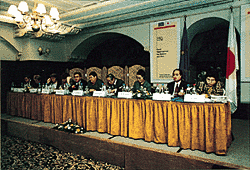|
| A. |
International cooperation through human resources development |
With the expansion of employment opportunities and improvement of living standards for people in developing countries, it has become an urgent task to improve the quality of their government officials and other people working in the field of labor matters and to train skilled workers who can support their industrialization.For this purpose, the Ministry of Labour has implemented the following types of cooperation.
| 1. |
International cooperation through international organizations, etc. |
Programs implemented include technical cooperation programs with the ILO, cooperation with the Asian and Pacific Skill Development Programme (APSDEP) and cooperation with APEC Human Resources Development Activities.
| 2. |
International cooperation at Polytechnic University |
Government-sponsored students from developing countries are accepted by the Polytechnic University, which aims to produce people who will contribute to the industrial development of their home country.
| 3. |
International cooperation through Japan International Cooperation Agency (JICA) |
Government officials from developing countries are invited for participation in seminars and experts in the fields of vocational training or industrial safety and health are assigned to developing countries to deliver technical assistance to their counterparts.
| 4. |
Technical cooperation conducted jointly with various organizations |
In addition to cooperating with JICA and other international organizations, the Ministry of Labour cooperates with non-profit corporations, private sector companies and other organizations to provide technical cooperation for holding seminars, implementing training programs, assisting in the formation of labor laws and systems in developing countries and solving employment issues.
| 5. |
Assistance to overseas vocational training in the private sector |
The Overseas Vocational Training Cooperation Center is utilized to assist the overseas vocational training activities conducted by private enterprises.The Center assists the enterprises in: i) training of vocational training instructors to enable training of foreign workers; ii) guides and advises Japanese instructors overseas; iii) collects and provides related information and advises enterprises conducting training; and iv) develops overseas vocational training materials.
| 6. |
Support to programs accepting foreign trainees |
In order to actively transfer technologies and skills from our country to developing countries, and contribute to the human resources development and economic growth of those countries, the Ministry of Labour provides, through the Japanese International Training Cooperation Organization, guidance and assistance to enterprises that accept foreign trainees to ensure that their training is properly and effectively conducted.
| 7. |
Proper implementation of the Technical Intern Training Program |
In April 1993, the Technical Intern Training Program was created with the goal of transferring more practical skills to developing countries, and cooperating in their efforts for the development of human resources to promote economic development.The Ministry of Labour conducts, through the Japan International Training Cooperation Organization (JITCO), various projects to ensure that this system is properly and smoothly implemented.
| B. |
Promotion of international exchanges |
It has become more and more important in recent years to deepen mutual understanding between Japan and other countries regarding labor issues.For this reason, the Ministry of Labour carries on various programs of international exchanges, as shown on the following page.

Japan-EU Symposium
|
